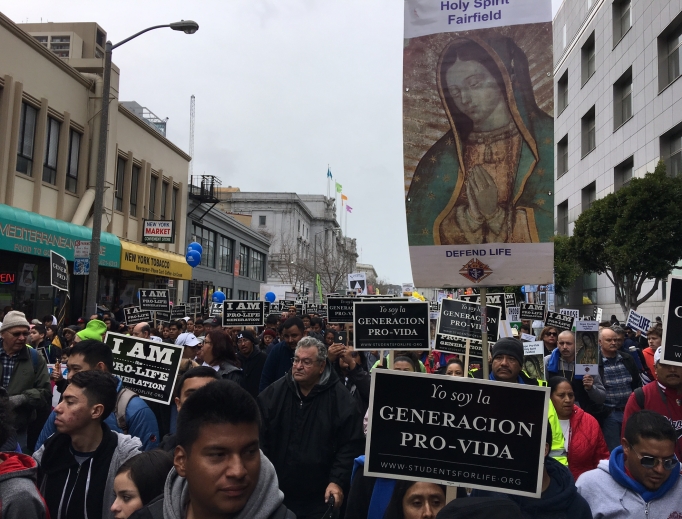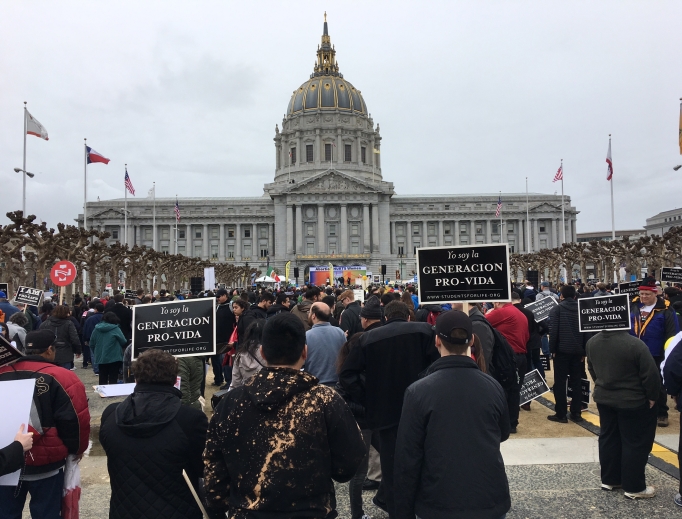Witnesses to Human Dignity Throng San Francisco’s Walk for Life West Coast
The 13th annual event drew tens of thousands of pro-lifers to the City by the Bay.

SAN FRANCISCO — Tens of thousands of pro-lifers marched in San Francisco last weekend to protest the grave harm that abortion inflicts on women and their unborn children.
“We stand here today because we understand the horror of abortion for children, for women, for men and ultimately our community,” said Melissa Ohden, a speaker at the 13th annual Walk for Life West Coast who survived a lengthy saline abortion against all odds.
“Being pro-life isn’t just about being pro-child. It’s about being pro-women and pro-love.”
At the Jan.21 event, Ohden joined a lineup of national and regional pro-life activists and Church leaders, who called on the crowd to challenge the rhetoric of abortion advocates who frame their cause as a campaign to defend women’s rights.
Protesters heard the painful stories of women who regretted their fateful decisions to have abortions or were pressured into having the procedure by their parents, doctors and boyfriends/husbands.
But they also listened to testimonies of courage and faith from women who refused to comply with such demands.
Pam Tebow, the mother of Heisman Trophy winner Tim Tebow, recalled her agonizing decision to reject advice from her physician that she end a difficult pregnancy by aborting her son. Instead, she prayed to God to protect her unborn child.
“We kept thinking we lost Timmy so many times,” said Tebow. “I continued to bleed, and the Lord took care of my baby.”
In his invocation at the rally preceding the Walk for Life, Bishop Steven Lopes of the Personal Ordinariate of the Chair of St. Peter, told the crowd of families and college students, women religious and priests that women like Tebow make the pro-life movement a powerful force for political and moral change.
“As every bishop knows ... it was the grassroots efforts of pro-life women who kept the issue alive during the darkest days, when it seemed as if abortion would be entirely normalized following the Supreme Court’s 1973 Roe v. Wade decision,” Bishop Lopes recalled.
“You are the reason people still cringe about abortion, even if they tell you they are pro-choice. You are the reason that we recognize the call to uphold the dignity of women and that of their unborn sons and daughters is one and the same.”
Countering Misleading Messages
Eva Muntean, a founder and organizer of the Walk for Life West Coast, told the Register that she was heartened by news that the nation’s abortion rate had dropped to historically low levels.
But Muntean also stressed the urgent need to counter the misleading message of Planned Parenthood and its allies who promote abortion rights as an essential protection for women. That misguided argument, she noted, was embraced by the Jan. 21 “March for Women,” which took place in Washington, D.C., and San Francisco, among other U.S. and global cities.
The organizers of the March for Women “are not just about abortion. But on the topic of abortion, they are for it,” said Muntean, pointing to the exclusion of pro-life groups from the March for Women’s sponsorship in the nation’s capital.
In San Francisco, where the Walk for Life West Coast and the local March for Women were scheduled for the same day, the organizers of both events worked successfully with police to keep things peaceful. Still, the two groups of protesters offered dueling visions of a woman’s path to self-respect and personal fulfillment.
At the March for Women, one sign read, “If men could get pregnant, there would be abortion clinics on every corner, just ike Starbucks!” Another sign read, “A girl’s place is in the resistance,” a statement that echoed the stance of many California Democrats, who have vowed to fight President Donald Trump’s policies on abortion, immigration and health care reform.
Young Catholics
Meanwhile, the Walk for Life, which was broadcast live on EWTN, challenged the notion that women must join a political alliance that embraces abortion rights to secure their dignity and rights. And the sea of Spanish-language signs proclaiming, “I Am the Pro-Life Generation” also suggested that many Hispanics did not hew to the Democrat Party line on abortion.

Sean Turgeon, a Fellowship of Catholic University Students missionary who brought 35 students to the Walk for Life from the University of Colorado at Boulder, said it was vital for young Catholics to take part in events like the Walk for Life and learn to engage those who disagree with their views.
“A lot of students don’t know how to live a pro-life lifestyle. It is hard to wake up every day and be pro-life, to stand up and be able to articulate [about] why the life [of an unborn child] has value,” Turgeon told the Register.
But after last year’s Walk for Life, he noticed that his students had “a growing boldness” about sharing their beliefs.
College students at the Walk for Life took inspiration from national pro-life activists like Reggie Littlejohn, president of Women’s Rights Without Frontiers, an organization that has targeted China’s one-child policy for heavy criticism. When she addressed the crowd, Littlejohn explained that she is now raising two Chinese girls, the daughters of a Chinese human-rights activist, who feared for their safety in their homeland.
The crowd cheered as Littlejohn introduced the two girls and then announced that President Trump would soon sign an executive order reinstating the Mexico City Policy, which bar federal dollars for organizations that promote and provide abortions abroad. Trump signed the executive order Jan. 23.

No Complacency
While many pro-life activists expect Trump to make good on a series of pledges to the pro-life community, speakers at the Walk for Life were far from complacent. The Democrat-controlled California Legislature, for example, strongly backs abortion rights, has sought to restrict the outreach of crisis-pregnancy centers, and recently legalized assisted suicide.
In an interview before the Walk for Life, Archbishop Salvatore Cordileone of San Francisco told the Register that the goal of overturning Roe v. Wade requires sustained political commitment from all the faithful.
But the San Francisco Church leader stressed that the larger mission of fostering a culture of life requires a spiritual foundation rooted in a deep friendship and trust in Christ.
Noting that the Walk for Life would take place on the feast of St. Agnes, Archbishop Cordileone said he would offer the young saint as a worthy example for Catholics.
“She was a virgin and martyr who reminds us of the importance of taking a stand to resist evil,” he said.
“So we have to strategize and organize, and we have to work within the political and social order [to overcome Roe v. Wade]. But our trust is in Jesus Christ, and we have to say, ‘Yes’ to him to accomplish any good.”
Archbishop Cordileone offered that simple exhortation during his homily at the packed Cathedral of St. Mary in San Francisco, where pro-life Catholics gathered for Mass before the Walk for Life.
Long lines had already formed for confession, as busloads of parishioners filed into the cathedral.
“Since we were little, our parents have taught us that God gave us life, and we must defend it,” Carlos Salazar, a Mexican immigrant who has lived in the U.S. for two decades, told the Register as he waited for Mass to begin.
Salazar and his wife, Yolis, who takes part in prayer vigils at a local abortion facility and is expecting their second child, joined two busloads of parishioners from Our Lady of the Pillar in Half Moon Bay, California.
Joe Quirk, a fellow parishioner at Our Lady of the Pillar, told the Register that his daughter’s ultrasound had deepened his resistance to legal abortion. Now, said Quirk, he is disturbed by the legalization of assisted suicide in his state, too.
“St. John Paul II was an incredible witness to the dignity of human life,” said Quirk. “By the end of his life, he was completely debilitated, yet he was more inspiring than when he was healthy,” he said.
The Grace of Courage
During the liturgy, a reading from Scripture reminded the congregation that God chose the weak and foolish to “shame the strong.” Likewise, Archbishop Cordileone drew his flock’s attention to the striking example of St. Agnes, who died a martyr’s death before she was 20 years old.
Christ “is the one who gives us the virtue we need to witness to, and be messengers of, life in the midst of so many forces destructive of human life and dignity,” said Archbishop Cordileone. “He gives us the necessary grace of purity, for if we are tainted by the moral corruption that surrounds us — in our behavior and attitudes, in what we look at and what we say, in how we spend our time and our money — then we are compromised. We will inspire no one. We will have betrayed Our Lord.”
Jesus Christ also gives his people the “necessary grace of courage,” he concluded.
“But when we fail to speak out on behalf of the sanctity of human life, of the beauty of God’s plan, woven into the very design of creation, of how new life comes about and is to be welcomed into this world; when instead we cower and allow ourselves to be intimidated into silence: Have we not also betrayed Our Lord? He is the one to give us the grace of courage, the courage of a martyr.”
Joan Frawley Desmond is a Register senior editor.

















